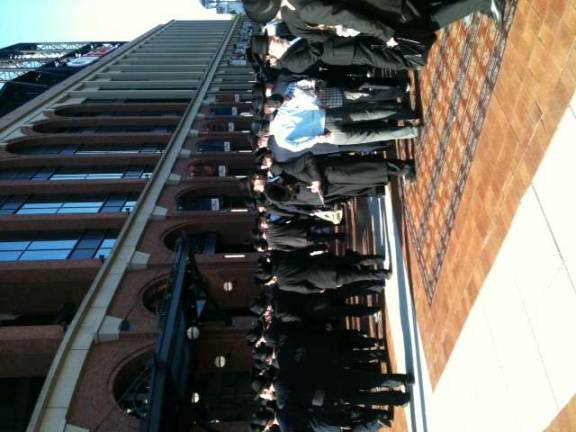What Happens When 40,000 Orthodox Jewish Men Take Over Citi Field?

The orthodox community came out to protest the dangers of the internet, but a counter rally shed light on a different problem-hushed up sex abuse. By Matt Harvey They traveled in cars and buses from far Rockland County and Lakewood, New Jersey. But mostly they took the subway from points in Brooklyn: Midwood, Crown Heights and Williamsburg. They spoke a mixture of Yiddish and English. By the strike of 8 pm on Sunday, well over 40,000 ultra-orthodox men-ranging in age from children with ringlets to gray-bearded grandfathers, representing all the iterations of Haredi dress-had passed through the gates of Citi Field and Arthur Ashe Stadium for what was billed by its organizers as a "big family meeting." It was an impressive show of strength by the standards of any religious movement. Event spokesperson, Eytan Kobre, an attorney and editor for Jewish newspaper, Mispacha, highlighted the night's stated theme, "raising awareness" about the dangers of an unregulated internet (especially readily accessible porn) with a broad-based secular appeal to family values. "Do you like clean water?" he asked reporters rhetorically. "These people just want clean internet!" Haskel Landau, who had come down from Muncie, New York, translated the main points found in the slim Yiddish volumes that each of the attendees had received at the gate for an inquisitive stranger. He said: "It tells you how to stay within the law when surfing the web." After briefly pausing to take a phone call, Landau hints that there might be more to the night's program than a simple rejection of the latest trapping of modernity, adding, "we're here to show that we have a group of very old rabbis protecting us." Members of the media and a small contingent of millennial bloggers who showed up dressed like cavemen and were chanting "ooga-booga"-in an ironical "counter-protest" to a perceived threat to their own internet freedoms-mostly took Kobre's anti-internet message at face value, but there were indications everywhere that the stately event (which cost between $1-$1.3 million depending on who you ask) had less to do with internet porn than a "rabbinical hierarchy" flexing its muscle in the face of mounting criticism about how it has handled accusations of child sexual abuse within the community. (Earlier this month the New York Times published a particularly explosive investigative account about Hasidic rabbis directing their congregants to shun members of its community who go to the police with allegations of sexual abuse against their co-religionists.) Such criticism flourishes online where it might otherwise lie dormant, explained Avi Burnstein, a 36-year-old Manhattan resident who was part of a more serious and larger counter-rally-made up mostly of former-Haredi, including [Deborah Feldman, author of the memoir Unorthodox](http://nypress.com/from-satmar-to-satisfaction-how-deborah-feldman-left-her-orthodox-roots/). "The Internet is not the problem," said Burnstein, who added, "90% of these families already don't use the Internet in their homes, they've already been told all about it." Hannah Shapiro, an attractive 35-year-old mother of four who very recently left a tightly-knit ultra-orthodox Brooklyn community was standing on Roosevelt Avenue holding up a sign in Yiddish that said, "Stand Up to Perverts." Choking back tears, she recalled "three close friends" who suffered at the hands of sexual predators and herself going to school with marked "signs of physical abuse that no one did anything about." She adds that her generation was "taught not to ask questions," but she hoped her presence on Roosevelt Avenue would "force some people to open their eyes." Standing as close as he could to the counter protest without feeling uncomfortable, a thirty-year-old Hasidic man from Midwood who would only give his name as Moishe, because his parents would "kill him" for even "watching" the counter-demonstration, agreed that the organizers of the event mainly want "outsiders," referring mainly to apostates and secular Jews, "to see their strength." Eyeing the signs and commotion across the avenue, his sentiments wavered from "curiosity" to "pity." Before finally walking back to Citi Field he said: "These are our people and they've cut their ties with friends and family . . . with well everything," he added unable to mask his astonishment. "It's just the type of thing an event like this is meant to avoid."